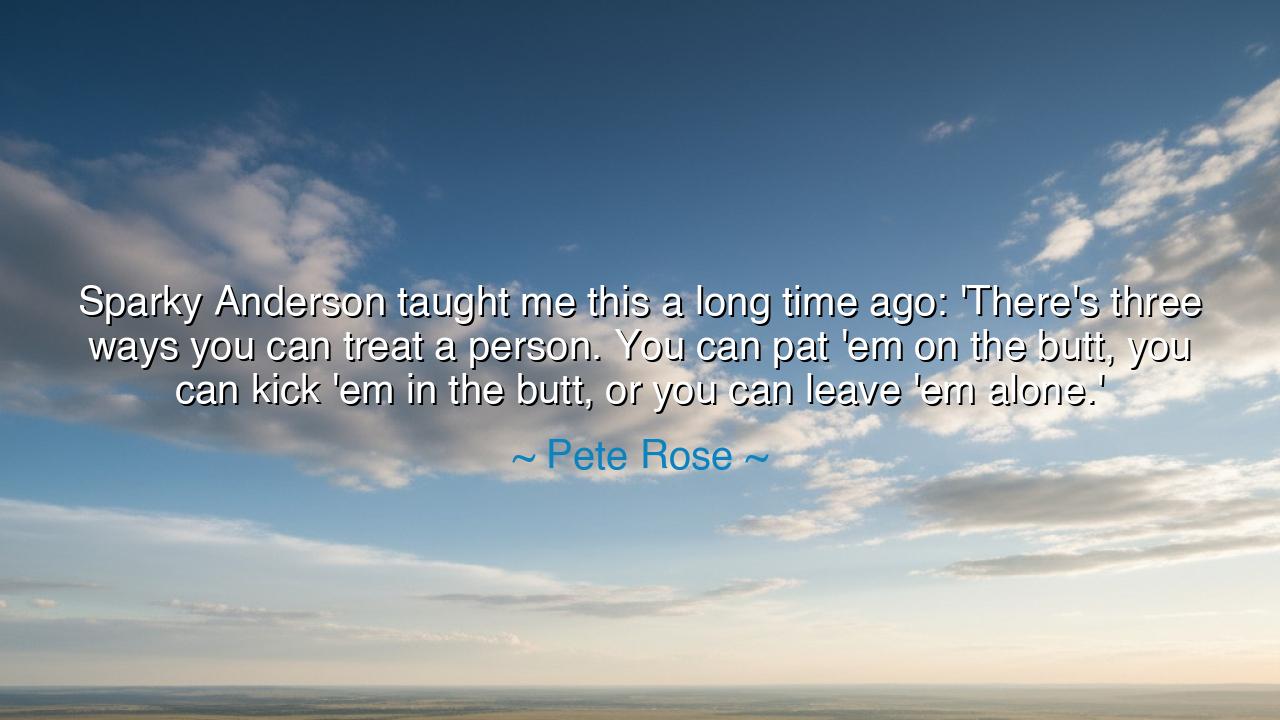
Sparky Anderson taught me this a long time ago: 'There's three
Sparky Anderson taught me this a long time ago: 'There's three ways you can treat a person. You can pat 'em on the butt, you can kick 'em in the butt, or you can leave 'em alone.'






“Sparky Anderson taught me this a long time ago: ‘There’s three ways you can treat a person. You can pat ’em on the butt, you can kick ’em in the butt, or you can leave ’em alone.’” — so said Pete Rose, the relentless and fearless ballplayer whose very name became synonymous with intensity and devotion to the game. But behind the raw humor and grit of this quote lies a deeper truth, one that reaches far beyond the baseball diamond. It is not merely a lesson in coaching or leadership — it is a lesson in understanding human nature, in recognizing that every soul responds differently to the trials, the praise, and the silence that life offers.
Sparky Anderson, the legendary manager who guided both the Cincinnati Reds and the Detroit Tigers to glory, was not only a master of strategy but a sage of character. In those few simple words, he taught Rose a timeless principle of wisdom in leadership — that to guide others, one must first learn to see them. The “pat on the butt” symbolizes encouragement, the acknowledgment of effort and the spark of belief that pushes a person forward. The “kick in the butt” is discipline, the necessary correction that keeps pride and complacency at bay. And the last, to “leave ’em alone,” is the rarest art of all — knowing when to step back, when silence and trust will teach more than any word or action could.
Each of these, in its time, becomes a sacred act of discernment. To pat a person on the back is to breathe confidence into their spirit — to remind them that their labor is seen and their worth recognized. To kick them, in the right measure, is to awaken the sleeping will within them — to show that strength sometimes grows best under the sharp edge of truth. But to leave them alone is to trust the maturity of their soul — to grant them the dignity of learning through their own trial. Thus, Sparky’s wisdom is not about control, but about understanding the seasons of the human heart.
History is full of such teachers who, like Anderson, understood that leadership is the balance between mercy and demand. Think of Marcus Aurelius, emperor and philosopher, who ruled not by fear but by reflection. In his meditations, he wrote that “a man must learn both to command and to yield.” He knew, as Sparky did, that a leader’s greatness is measured not by his power, but by his sensitivity to the needs of his people. Marcus would have recognized in Sparky’s words the eternal rhythm of leadership: encourage when the heart is weary, correct when the path is lost, and step aside when the soul is ready to walk alone.
Pete Rose himself embodied the raw spirit that this teaching shaped. Known as “Charlie Hustle,” he played with fire, grit, and boundless energy. For a man like him, a pat on the back might have fueled his determination, while a kick might have stoked his defiance. Sparky Anderson, wise in human temperament, knew when to use each. Their bond was not just of coach and player, but of master and apprentice — the passing down of a way to understand men. In the fierce and demanding world of professional sport, where egos burn bright and failure looms daily, this trinity of approaches was the key to harmony.
Yet this lesson extends far beyond sports. In families, friendships, and workplaces, we too must discern how to treat others. Some around us hunger for affirmation, for a word of warmth to remind them they matter. Others need challenge, a hard truth to wake them from comfort. And sometimes, the greatest gift we can give is space — the freedom for another soul to find its own balance. The wise person learns not to treat all alike, but to listen first, to understand, and then to act with purpose and compassion.
Lesson: Seek to know the hearts of those around you. When someone struggles, ask yourself: do they need your encouragement, your correction, or your silence? Be generous with your praise, firm in your truth, and gentle in your restraint. For wisdom lies not in constant action, but in right action at the right time. The leader, the friend, the parent who learns this will nurture greatness in others and peace within themselves.
Thus, Sparky Anderson’s teaching, passed through the voice of Pete Rose, becomes a philosophy for all generations. “You can pat ’em, you can kick ’em, or you can leave ’em alone.” Simple words, yet within them lives the whole art of guidance and the eternal mystery of human connection. To understand when to do each is to touch the very heart of wisdom — to lead, not by force, but by insight, patience, and love.






AAdministratorAdministrator
Welcome, honored guests. Please leave a comment, we will respond soon